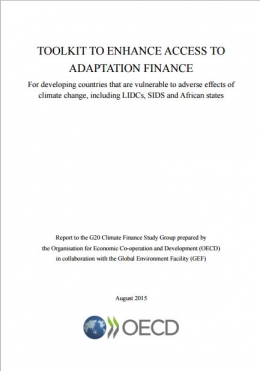Toolkit to Enhance Access to Adaptation Finance for developing countries that are vulnerable to adverse effects of climate change, including LIDCs, SIDS and African states
The impacts of climate change are already being felt by developing countries that are particularly vulnerable to the adverse effects of climate change including Low Income Developing Countries (LIDCs), Small Island Developing States (SIDS) and African states1 (hereafter, the countries). Effective adaptation and climate-resilient development in these countries is predicated on proper access to financial, technological and human resources (IPCC, 2014a). Analysis by the United Nations Environment Programme shows that adaptation needs will likely be greater in least developed countries (LDCs) and SIDS and the failure to implement early adaptation in such countries will have a disproportionate impacts on their vulnerability in the period after 2020 (UNEP, 2014).
This toolkit outlines a spectrum of “tools” that could help the countries navigate the evolving architecture of climate finance and seize opportunities for accessing finance for adaptation. The tools are not prescriptive, intrusive or exhaustive, but aim to provide practical and technical solutions, including to: identify and support adaptation as a national priority; design fundable projects and programmes; better link with available funding; and enhance in-country capacities and enabling environments to attract investments from a wide variety of sources.
The toolkit primarily focuses on enhancing access of the countries particularly vulnerable to climate change (including LIDCs, SIDS and African states) to international climate finance trust funds, while recognising that various domestic resources within those countries will also be important to finance and scale up adaptation action. In terms of targeted audience of the toolkit, section 2 on challenges may be more relevant to senior government officials and politicians, whereas section 3 of the toolkit was developed mainly for, but not limited to, climate practitioners (e.g. policy makers and project proponents). The toolkit may also be useful for development co-operation providers (e.g. governments and bilateral agencies that provide support, multi-lateral development banks, international climate funds and private investors), when they consider how to improve access and effective use of climate finance by recipient countries.

